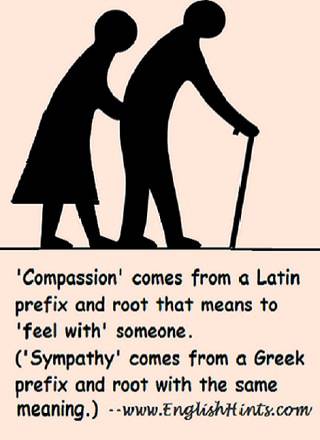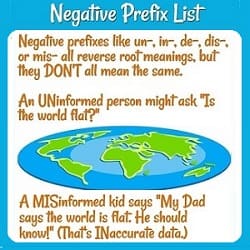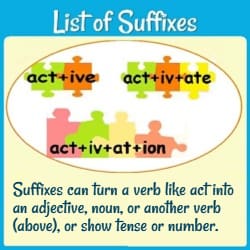8+ Common Prefixes that Dominate Academic Vocabulary
These common prefixes are the keys to hundreds of English words. (Check com-, con-, or re- in any good English dictionary.) Add the negative prefixes in-, un-, de-, and dis- (see Negative Prefix List), and you will have a huge head start in understanding academic vocabulary.
This page has three sections: Prefixes of Location (examples of academic vocabulary using ex-, in/im-, sub-, and trans-), Prefixes Showing Relationships (examples of words using com/con-, sym/syn-, anti-, contra-, and ob/op-), and Gap-fill Practices using those words. The prefix ‘re-‘ gets its own page, with examples and a matching practice.
Common Prefixes of Location
Examples of Ex- (out of) + Roots with Meanings:
• explicit- unfolded, (opened out)
• export- to carry out of the country
• expose- to put out into the open
• external/exterior-- outside
• extract- to draw or pull out
Examples of In-/Im- (when it means in, into, or on)
(see also Negative Prefix List for its more common meaning, ‘not’)
• import -- to carry into one’s country
• impose- to put demands onto people under someone’s authority
• inclination-- a leaning into or preference
• incorporated-- made into one body (or organization)
• instruct-- to build on or teach
• internal/interior -- inside
• invoke-- to call on
Examples of Sub- (under)
• submit (to)-- to put or bow one’s will under the will of another
• subsequent-- following under (after)
• substitute-- to put into the place of another
• subvert-- to work from beneath to overturn a government or a plan
• succession-- the order in which subordinates take the place of a leader who dies
• support-- to carry or hold up from underneath
Examples of Trans- (across, beyond)
• transfer-- to bring across
• transformation-- a complete change of form
• transition-- going across, passing over (to something new)
• translate-- to carry across from one place or language to another
• transmission-- sending across
• transportation-- means of carrying things across distances
• transpose- to put something across (most often, to change a musical composition to another key.
Common Prefixes Showing Relationships

Com- (Con-, Co-) or Sym- (Syn-): ‘with’
• community-- a group (town or neighborhood) that lives together
• conclude-- to finish something or finish putting thoughts together-- reach a conclusion.
• conference-- a group that is brought together to consider an issue
• contemporary-- living at the same time or happening during the same period
• symmetry-- literally a ‘common measure’: two objects with similar, well-balanced proportions
• sympathetic-- interested and sharing someone’s feelings; feeling sympathy
• synchronize- to time together; happening at the same time
• synonym-- a word with a similar meaning (literally “named with”)
• synthesize- to put two ideas or substances together with each other to make something new
Anti-, Contra-, and sometimes Ob- (Op-): ‘against’
anti- is often used with a hyphen to show opposition: anti-American, anti-bacterial, anti-communist
Other words for opposition:
• antagonist-- a competitor or opponent
• antipathy-- very strong dislike or hatred
• antithesis-- the opposite of an idea
• antitoxin-- a medicine that reduces the effect of poisons
• contradict-- to ‘speak against.’ Contradictory ideas are ideas that cannot both be true.
• controversy-- opposition: a turning of one group against the ideas of another
• counteract-- to act against something and prevent it from working
• opponent-- someone who is against something (opposes it.)
(A person in favor of something is a called a proponent, and they may ‘propose’ or suggest an idea. We also talk about the ‘pros’ and ‘cons’ of an idea or choice-- the points in favor of and against it.)
Practice Common Prefixes
Choose and type the best word for each gap from the list above each paragraph. If you need a clue, click on the question mark for the first letter. (It will show up below the box saying "Check." This will subtract points from your score, however.)
You can probably guess even words you aren’t sure of by their endings, since only one part of speech (a noun, verb, OR adjective) will fit in most of the gaps, and there are other limits on which words are possible.
Most of this page (and The Prefix 'Re-') is also available in pdf worksheet form (for classroom practice offline) in the prefix packet and root and affix packet and bundles on the Root, Prefix, and Suffix Worksheet page.
See The Prefix ‘Re-’ for more examples and matching practice, or Negative Prefix List and Practice Negative Prefixes for other very common prefixes.
Related Pages
The explanations & examples in this negative prefix list can help you use them without confusion.
Use this list of suffixes (with examples) to build your vocabulary.
Knowing a few roots & prefixes can help you figure out meanings of new words.
Didn't find what you
needed? Explain what you want in the search box below.
(For example, cognates, past tense practice, or 'get along with.') Click to see the related pages on EnglishHints.
| site search by freefind | advanced |









